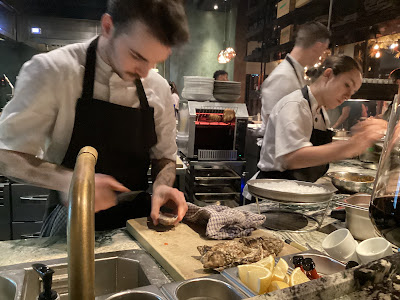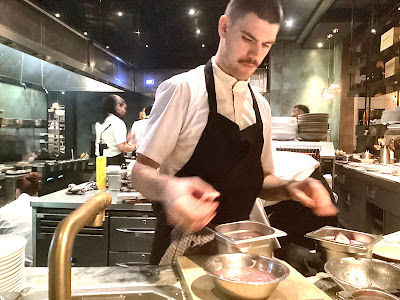Kurry Kingdom opened four years ago on 19 November 2020, squeezing its launch in between the series of lockdowns related to the COVID-19 pandemic which were assaulting the viability of many hospitality businesses at that time, at the site of a former Italian restaurant Bank which was named from its location in a former branch of one of the banks.
The Bangladeshi restaurant seems to have been remarkably popular since it opened, attracting satisfied reviews on the dreaded Tripadvisor and, even better, managing to stay open despite the slings and arrows of outrageous fortune which the hospitality industry continues to be hit by right up to the Starmer government’s recent antibusiness measures announced in its November budget.
Its Facebook page tells us that, “Continuing the legacy of one of the founding pioneers of the Curry Trade in Birmingham. We are here to bring you back a master class in the art of a fine cuisine from our ancestors across Bangladesh, India, South west Asia”. That’s interesting. Prior to my visit to Kurry Kingdom, I was intrigued to know who this “founding pioneer” was and was optimistic I might find out because this apparently notable figure is not identified on the website despite being hinted at. The other discovery I wished to make was of course, whether or not I was going to experience “a master class in the art of a fine cuisine”.
Prior to doing so, on a historical note, I found a menu first introduced when the restaurant opened in 2020. It was extremely long and full of almost every south Asian dish one could imagine. This did not seem like good news.
It has to be said that it was not really possible to indulge in a relaxed meal as I found that my elderly dining companions had no intention of eating Indian food and had mostly never tried it. Now they felt it was too late to do so as they believed the effects on their gastrointestinal system would be too devastating at least in terms of severe nocturnal indigestion - no fault of the food, rather the result of aging. They had been hoping to be served steak and chips which was on the menu but alas we were told that there was no steak at least until tomorrow.
It was best, I thought, to get on with sampling what was being served. I started off with poppadoms which were pleasingly peppery accompanied by a remarkably ambitiously large pickle and chutney tray which covered the range from the aggressively acidic (mango piclkle) to the the sweet and soothing (raita and mango chutney which woukd have benefitted from it having a little more body to it.
In place of steak, my dining companions had opted for salmon, but had not been informed that this was a a piece of salmon marinated in spices (which was obviously a problem as they had already rejected anything with the mildest spiciness to it) so that was returned to the kitchen and eventually they settled for scampi and chips which met their approval so that was alright then. The restaurant’s staff dealt with all this with good humour and patience. I was impressed by the what looked like finely cooked chips which were served to the curry naysayers but as for the scampi I can say nothing save that it looked like, er, … scampi.

The restaurant has no bar licence and one may bring one’s own tipple if one so wishes but we had none and so I opted for a jug of nicely blended mango lassi which I eventually coaxed my dining companions into sampling and which obtained their evolving approval leaving me with just a small quantity for myself as they realised some ‘Indian food’ can be fun and they glugged it down. Oh, the Labours of a gastronomic Hercules.
There was little enthusiasm among the English food eaters for a starter and so I ordered onion bhaji for myself which was presented as three crispy little spheres which promised much but delivered less, there being very little flavour in them, with none of the sweetness of caramelised onion for which I had been hoping. For the main, I had my old favourite of lamb dhansak - a complex dish, centred on lentils, though routine on a south Asian menu - it should be dry and sour and sweet and moderately hot, all together. In English restaurants it is usually served with pieces of pineapple to bring out the sweetness though as this is, allegedly, originally a Persian dish, I am a little dubious about any degree of authenticity the pineapple, indigenous to South America rather than South Asia, might give to it.
The lamb was very nicely cooked - delightfully tender and moist - and the sauce had a spot-on dryness to it, and well-judged heat, but there was no real hint of sweetness which would have lifted an otherwise middling-flavoured dhansak to something of great pleasure. There were little cubes of pineapple lurking in the gravy but they had little sweetness to them and contributed very little. Nor was there any hint of sourness. The dish rose above the humdrum but was hardly attempting to reach the heights. The dhansak was served with some nicely cooked rice - I ordered plain rice but the more expensive pilau rice was served.




This meal may have been more successful if it had been shared with companions who actually wanted to eat Indian/Bangladeshi food but in the end, after decades of visiting south Asian restaurants, I have to conclude that while the service was enthusiastic, patient and even kind, problems arose from the restaurant not being able to serve what was on the menu and not conveying successfully to uninformed customers what was actually going to be served to them. The atmosphere is very good but the food did not seem to have the depth and sophistication of flavour that I wanted.
I never did find out who exactly was “one of the founding members of the Curry Trade in Birmingham” whose legacy the restaurant represented..
Rating:- 🌛🌛.
5 December 2024.











































